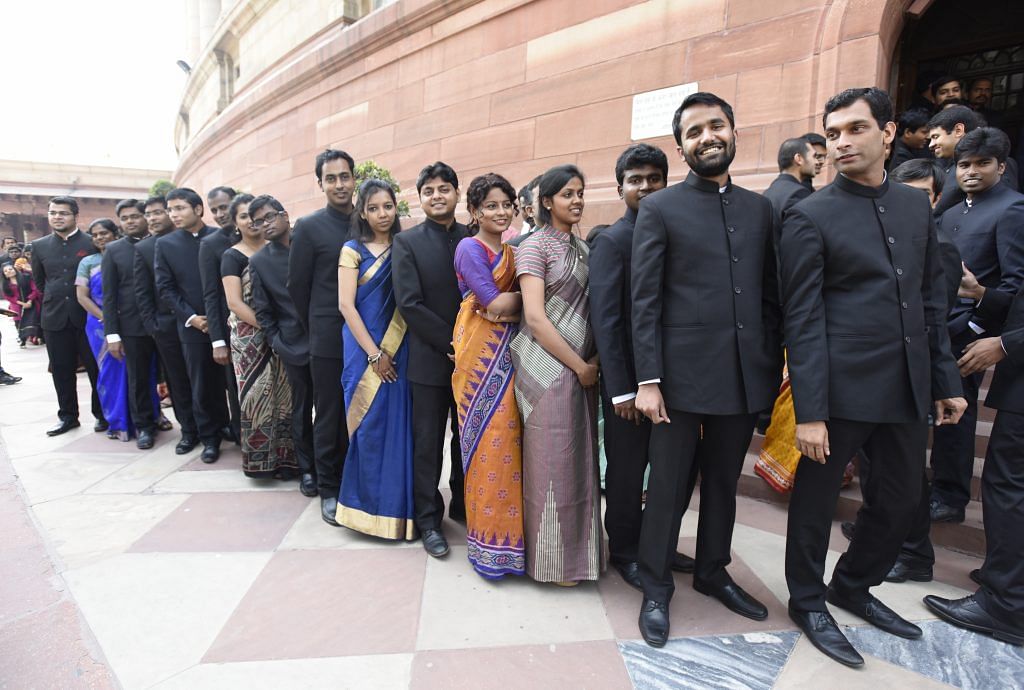From a physics grad heading home ministry to an English scholar in agriculture, 49 of 57 secretary-level IAS officers in posts at odds with their educational qualification.
New Delhi: The man in charge of India’s internal security is a physics graduate, while the man in charge of agriculture is an English scholar; the top bureaucrat in the power ministry has studied botany.
It is the story of almost all secretary-level officers in the Indian government, whose educational qualifications have very little to do with the posts they hold. Of the 57 secretary-rank IAS officers, only nine are currently heading ministries that have a direct relation to what they have studied.
The Centre’s advertisement, allowing ‘talented and motivated Indian nationals’ a lateral entry into government services, has been praised and panned. It has also restarted a long-standing debate regarding the bureaucracy — should officers be allotted ministries and departments as per their area of expertise?
ThePrint analysed the educational qualifications and backgrounds of the secretary-rank IAS officers in the government as per their executive records available online. While the advertisement released Sunday was for posts at the joint secretary level, in order to assess the level of expertise of officials at the highest echelons of Indian bureaucracy, we analysed the qualifications of secretary-level officers alone. And though there are 81 secretaries in the government of India, 57 belong to the IAS, while the rest belong to other services.
No relation between education and post
The educational backgrounds of many secretaries have little to do with the domains they are heading.
Consider this: The home secretary, Rajiv Gauba, is a graduate in physics while Rita Teaotia, the secretary in the Ministry of Commerce and Industries, holds a post-graduate degree in history.
The environment secretary, Chandra Kishore Mishra, has degrees in history and law, even as the only secretary-level officer to have a degree in environmental sciences, Shobhana K Pattanayak, heads the department of Agricultural Cooperation and Farmers Welfare in the agriculture ministry.
The justice secretary in the law ministry, Alok Shrivastava, on the other hand, has studied everything but law — electrical engineering, public policy, science and economics.
The secretaries of the sports and youth ministries possess diverse educational degrees that have nothing to do with sport or youth. Rahul Prasad Bhatnagar, who heads the sports department, has studied physics and economics, while Amarendra Kumar Dubey, who heads the youth affairs department, has studied botany, law and economics, among other things.
Agriculture secretary Tarun Shridhar is an MPhil in English, while Ajay Kumar Bhalla, who has studied botany, is the secretary in the Power Ministry. The department of official languages in the home ministry is headed by Sailesh, an economics post-graduate.
Domain experts missing
The finance and defence ministries, which ostensibly require the highest degree of expertise, particularly lack domain experts.
None of the five secretaries in the finance ministry have a degree in economics.
Of the five, Neeraj Kumar Gupta and Ajay Narayan Jha have studied electronics and history, respectively; Rajiv Kumar has degree in zoology and law.
The two others, however, are business studies graduates. While Hasmukh Adhia has studied accountancy and business management at the graduate and post-graduate level, he also has a PhD in yoga. Subhash Chandra Garg, who heads the economic affairs department, has a degree in accountancy and finance.
In the defence ministry, Sanjay Mitra, who heads the defence department, has studied physics and economics, Ajay Kumar, who heads the defence production department, has studied engineering and applied economics. However, Dr Christopher S, who is a scientist, heads the department of R&D in the ministry.
This disparity is being cited by backers of the government move as a much needed disruption of a system that fails to bring in domain experts to formulate policy for the country. Doubters, however, fear that the government could use the move to usher in political appointments.
Full list of educational qualifications of 57 secretary-ranked IAS officers
The few exceptions
Asha Ram Sihag, who serves as the secretary in the Ministry of Heavy Industries and Public Enterprises, has actually studied industrial engineering, while Raghvendra Singh in the Culture Ministry, has studied history at both the graduate and post-graduate level.
Girish Sahni and Renu Swaroop, secretaries in the Ministry of Science and Technology; Sekhar Basu, secretary in the Department of Atomic Energy; Rajeevan M. Nair, secretary in the Ministry of Earth Sciences and Sivan K, secretary in the Department of Space are all scientists — given that these posts have been traditionally reserved for scientists.
The list of exceptions also includes two secretaries — those of the department of legislative and legal affairs — in the law ministry who are domain experts.
The Ministry of External Affairs consists of only IFS officers, while the department of Posts in the communications ministry is headed by an Indian Postal Services officer, Anant Narayan Nanda.
Most other secretaries in the government are IAS officers who have risen up the ranks, hopping from one domain to another, irrespective of their educational qualification.
Resistance to reform
This isn’t the first time that the question of lateral entry into the civil services has cropped up. In 2008, when the second Administrative Reforms Commission (ARC) had called for lateral entry at both the central and state level, resistance from bureaucrats ensured that the recommendation did not see the light of day.
In fact, when Vaidya Rajesh Kotecha, an ayurvedic doctor, was appointed as the secretary in the Ministry of AYUSH last year, in what was reportedly the first instance of lateral entry at the secretary level, there were reports of much resistance from officials.
Parameswaran Iyer, the secretary in the ministry of drinking water and sanitation too is a lateral entrant, who had prematurely retired from the IAS to work at the World Bank and was head-hunted by the Modi government from there.
पढ़ें हिंदी में: शीर्ष आईएएस अधिकारियों की शिक्षा का उनके कार्य से मेल खाना महज़ एक इत्तेफ़ाक़
